|
|
|
Sort Order |
|
|
|
Items / Page
|
|
|
|
|
|
|
| Srl | Item |
| 1 |
ID:
131704
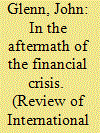

|
|
|
|
|
| Publication |
2014.
|
| Summary/Abstract |
This article examines the financial reforms that have been undertaken through two perspectives on risk: that of Beck's world risk society and an alternative Foucauldian approach. The former argues that, catastrophes such as the recent financial crisis will induce a political shift towards a cosmopolitan form of statehood. Yet, the lack of radical reform since the financial crisis would suggest otherwise. The article therefore argues that what we are witnessing is best understood in terms of reflexive governance in which the various rationalities of risk are reassessed and strengthened in order to avoid a similar occurrence in the future. Moreover, in response to the uncertainty that surrounds such rare events, more intense forms of surveillance have been adopted with the objective of pre-empting any future crisis. Yet, for various reasons, the reforms remain rather limited and the new rationality of pre-emption is unlikely to prevent further crises from occurring in the future.
|
|
|
|
|
|
|
|
|
|
|
|
|
|
|
|
| 2 |
ID:
131712
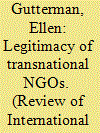

|
|
|
|
|
| Publication |
2014.
|
| Summary/Abstract |
This article develops theoretical insights concerning the legitimacy of non-profit Transnational Non-Governmental Organisations (TNGOs) in global governance. The research compares the advocacy initiatives of Transparency International (TI), the leading TNGO in the international regime of anti-corruption, in Germany and France during the 1990s. The main argument is that the legitimacy of TNGOs is a relational concept: it is granted or denied in a relationship between at least two parties, in which actor attributes play a role but are not decisive. Only such a relational conception can explain why a given TNGO is granted legitimacy in one context and denied it in another. In addition, legitimacy matters. Although insufficient on its own, legitimacy is a necessary condition for effective advocacy, which TNGOs can generate endogenously. To the extent that the legitimacy of TNGOs depends on their acceptance by dominant groups and powerful decision-makers, therefore, 'legitimate' TNGOs may function to sustain rather than challenge the structures of power which condition global outcomes in ways that are often contrary to the goals of equality, fairness, and justice. Thus to assess the impact of TNGOs in global governance, one must examine which TNGOs have been granted (or denied) legitimacy and influence, and why.
|
|
|
|
|
|
|
|
|
|
|
|
|
|
|
|
| 3 |
ID:
131711
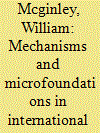

|
|
|
|
|
| Publication |
2014.
|
| Summary/Abstract |
This article looks at prospects for a mechanism-based research strategy in the study of International Relations. Over the past three decades, the notions of mechanism and microfoundation have taken a central place in discussions of explanation and 'micro-macro' problems in social science. The upshot of much of this discussion has been a call for mechanism-based explanations - explanations of macro-level phenomena in terms of micro-level mechanisms. Some work of this kind can already be found in IR theory, including in systemic research. However, a number of IR theorists, including Kenneth Waltz and Alexander Wendt, have argued that micro-oriented strategies like this will not work, pointing to incongruities between system- and unit-level phenomena. This article argues that these pose less hindrance to a fully-developed model of mechanism-based explanation, and that the field has much to gain from further exploration of this strategy. In particular, mechanism-based explanations could help bring structure back to the centre of discussion in IR theory, and might even give us a way out of the field's own micro-macro problems.
|
|
|
|
|
|
|
|
|
|
|
|
|
|
|
|
| 4 |
ID:
131709
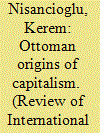

|
|
|
|
|
| Publication |
2014.
|
| Summary/Abstract |
The history of capitalism's origins is unmistakably Eurocentric, placing sixteenth-century developments in politics, economy, culture, and ideology squarely within the unique context of Europe. And while the disciplinary remit of International Relations (IR) should offer a way out of such European provincialism, it too has been built on largely Eurocentric assumptions. In Eurocentric approaches, the Ottoman Empire has been absent, passive, or merely a comparative foil against which the specificity and superiority of Europe has been defined. And yet, the Ottoman Empire was arguably the most powerful actor in the Early Modern period. In this article, I argue that any history of capitalism's origins must therefore account for the historical importance of the Ottomans. In doing so, this article seeks to address the non-European blind-spot, both in theorisations of capitalism's origins and in IR theory, by reincorporating the material significance of the Ottoman Empire in historical processes, which led to the transition to capitalism. I do so by utilising the theory of Uneven and Combined Development, and in the process seek to defend its credentials as a non-Eurocentric social theory on the one hand and as a sociologically and historically sensitive theory of international relations on the other.
|
|
|
|
|
|
|
|
|
|
|
|
|
|
|
|
| 5 |
ID:
131708
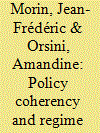

|
|
|
|
|
| Publication |
2014.
|
| Summary/Abstract |
This study argues that 'regime complexes' and 'policy coherence' are two faces of the same integrative process. The development of regime complexes co-evolves with the pressures on decision makers to coordinate their policies in various issue-areas. Conceptually, we introduce a typology of policy coherency (erratic, strategic, functionalistic, and systemic) according to its procedural and substantive components. Empirically, by triangulating quantitative and qualitative data, we use this typology for the case of the genetic resources' regime complex to illustrate the links between regime complexes and policy coherency. Our results suggest that a coherent policymaking process favours integrated regime complexes, while greater exposure to a regime complex increases the pressure to have a coherent policymaking. This study fills a gap in the literature on regime complexes by providing a micro-macro model linking structure to agency.
|
|
|
|
|
|
|
|
|
|
|
|
|
|
|
|
| 6 |
ID:
131706
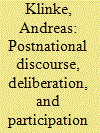

|
|
|
|
|
| Publication |
2014.
|
| Summary/Abstract |
An emerging task in world politics is to cope with human-induced global risks in domains such as environment, economy, security, and health. Current global governance institutions are largely incapable of tackling global risks and applying deductive policy models, which is why new modes of interaction may become essential. In this article I argue that through focused discourses, key peculiarities of global risks, namely complexity, scientific uncertainty and sociopolitical ambiguity, may be identified and understood. To this end, distinctively discursive and pragmatic learning processes can be developed. Different forms of deliberation and participation help develop processes that meet the challenges, problems, and conflicts that result from the key peculiarities of global risks. Hence, the article establishes a causal link between key peculiarities of global risks and postnational discourses. I discuss the varying forms of deliberation and participation (epistemic institutions, associational policy making, and transnational public deliberation and participation) of three discourses that produce institutional problem solving capacity in global risk governance. To this end, this article links theory and practice as well as normative conceptualisation and institutional feasibility.
|
|
|
|
|
|
|
|
|
|
|
|
|
|
|
|
| 7 |
ID:
131710
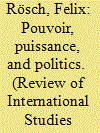

|
|
|
|
|
| Publication |
2014.
|
| Summary/Abstract |
Hans Morgenthau's concept of power is widely debated among scholars of International Relations. Superficial accounts present Morgenthau's concept of power in the Hobbesian tradition as a means of self-preservation; however, more thorough investigations demonstrate Morgenthau's psychogenic and praxeological understanding. By referring to Sigmund Freud and Max Weber, such accounts identify Morgenthauian power as the ability to dominate others. This article contributes to this discourse by demonstrating that Morgenthau separated power into two dualistic conceptualisations. Although analytically Morgenthau worked with a concept of power understood as domination, normatively - in reference to Friedrich Nietzsche and Hannah Arendt - he promoted a concept of power that focused on the will and ability to act together. Elaborating this dualistic concept has wider implications for current International Relations because it reminds scholars to be self-reflexive. In addition, it is argued that a Morgenthauian scholarship helps scholars to gain a more profound understanding of depoliticising tendencies in Western democracies.
|
|
|
|
|
|
|
|
|
|
|
|
|
|
|
|
| 8 |
ID:
131703


|
|
|
|
|
| Publication |
2014.
|
| Summary/Abstract |
Even before the global financial crisis restored the International Monetary Fund's ('IMF' or 'Fund') political fortunes, the 'monetary managers' regained ground in supposedly hostile parts of the world, most notably in sub-Saharan Africa. To shed light on the Fund's appeal to governments that do not need its leverage to put dithering cabinets, unruly coalition partners, or restive opposition forces in line, this article examines the interplay between intergovernmental organisations (IGO) and the 'master institutions' of the anarchical society. It builds on classic English School inquiries into the 'words and deeds' of agents that define, maintain, and transform international societies; tracks collective efforts to harness international credit and debt; and probes bureaucratic obstinacy and great power management in the Fund's conduct in three member states that differ in terms of their borrowing habits, funding options, and creditor relations. It concludes that, in contrast to its reputation as a technocratic manager of cooperation or an imperial agent of contestation, the IMF's appeal lies in its willingness to act as a diplomatic champion of coexistence.
|
|
|
|
|
|
|
|
|
|
|
|
|
|
|
|
| 9 |
ID:
131705


|
|
|
|
|
| Publication |
2014.
|
| Summary/Abstract |
Even before the global financial crisis restored the International Monetary Fund's ('IMF' or 'Fund') political fortunes, the 'monetary managers' regained ground in supposedly hostile parts of the world, most notably in sub-Saharan Africa. To shed light on the Fund's appeal to governments that do not need its leverage to put dithering cabinets, unruly coalition partners, or restive opposition forces in line, this article examines the interplay between intergovernmental organisations (IGO) and the 'master institutions' of the anarchical society. It builds on classic English School inquiries into the 'words and deeds' of agents that define, maintain, and transform international societies; tracks collective efforts to harness international credit and debt; and probes bureaucratic obstinacy and great power management in the Fund's conduct in three member states that differ in terms of their borrowing habits, funding options, and creditor relations. It concludes that, in contrast to its reputation as a technocratic manager of cooperation or an imperial agent of contestation, the IMF's appeal lies in its willingness to act as a diplomatic champion of coexistence.
|
|
|
|
|
|
|
|
|
|
|
|
|
|
|
|
| 10 |
ID:
131707


|
|
|
|
|
| Publication |
2014.
|
| Summary/Abstract |
Conventional understandings of security cooperation are rooted in the state-centric and materialist assumptions dominant in the Cold War and subscribe to the dictum of the Reagan years, 'trust but verify'. In today's more complex setting, however, governance arrangements with the most potential to address constantly mutating security threats, such as the concern over nuclear terrorism, may not be those solely designed to ensure compliance, but rather those that are better equipped to identify and solve new problems. This article draws on a burgeoning literature on 'new' or 'experimental' governance and advances an analytical framework to consider the extent to which states and other actors might be turning toward an alternative set of mechanisms that rely more heavily on non-binding standards and recommendations, peer review, increased participation, and experimentation to generate new knowledge about the challenges they face, even in the 'hard' case of security cooperation. It then explores this potential reorientation in two separate, but complementary cases that have emerged as key tools in preventing illicit nuclear proliferation: the Financial Action Task Force on Money Laundering (FATF), which seeks to bolster states' counter-financing of terrorism systems, and the UNSC Resolution 1540 Committee, which guides efforts to fill the governance gaps in the nuclear non-proliferation regime. Although both cases on paper contain more traditional enforcement components, in practice they rely increasingly on experimental governance. The article concludes with an evaluation of the promise and limits of an experimentalist framework in understanding the evolution of governance arrangements in response to a more complex security environment and suggests potential avenues for future research.
|
|
|
|
|
|
|
|
|
|
|
|
|
|
|
|
|
|
|
|
|